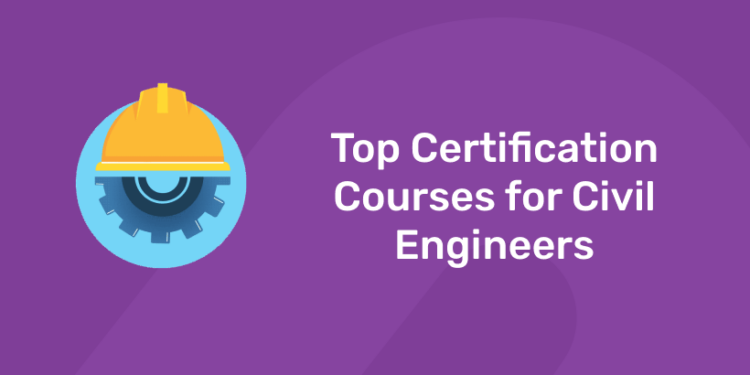Table of Contents
The civil engineering profession is evolving faster than most graduates expect. Technology (BIM, cloud collaboration), sustainability standards, and complex infrastructure projects mean employers increasingly look for specialised skills and verified credentials, not just a degree. In 2026, the smartest civil engineers will be those who combine strong fundamentals with targeted upskilling in industry-leading tools and certifications.
This long-form guide explores the highest-value certification courses for civil engineers in 2026, why they matter, where they’ll boost your career (geo-aware guidance), and how to plan your learning pathway.
Top 8 Certification Courses for Civil Engineers
Transportation planning is the process of identifying future policies, goals, investments, and spatial planning designs to meet future transportation needs. Transportation planners use a multi-modal and/or comprehensive strategy to analyze the various possibilities and implications of the transportation system to influence favorable outcomes. So, the scope of transportation professional courses has its demand. The transportation planning certification program is intended for applicants with a diverse background in transportation planning education and experience.
Quantity Surveying Certification Course
A quantity surveyor is a professional in the construction sector who is knowledgeable about construction prices and contracts. Quantity surveying is a branch of construction that estimates and manages construction costs. A Quantity Surveyor determines the client’s requirements and estimates the cost and material scales for labour. He or she is additionally responsible for producing contract documents, analysing commercial risks, managing subcontractors, developing a detailed budget, and guaranteeing the overall success of the construction process.
Build a career in Quantity Surveying with Entri! Explore Here!
Structural Software Training
Structural software is used to develop and evaluate architectural designs. It is generally used by civil engineers and is also known as structural engineering software or civil engineering software. To achieve their professional goals, these engineers must be skilled in data interpretation and digital dimensional manipulation.
The Structural Engineering Certification Program (SECP) is administered by the National Council of Structural Engineers Associations (NCSEA). Structural Software Traning Program are used to analyze Structures by providing the input into the Software and calculating the output. The design can be optimized within the given range of boundary conditions based on the results. With STAADPro and ETABS, a well-known Structural software, you can quickly analyze and evaluate the outcomes at a faster rate with more thorough reports, as well as draught Structured working drawings for execution work, which improves your skills for professional progress.
A bachelor’s degree in civil or structural engineering from an approved university or a credible Structural Design Certification are the prerequisites for becoming certified as an engineer. They must then pass a comprehensive exam that tests their knowledge of structural engineering principles, materials, design methods, and construction practices.
Building Information Modeling (BIM) Certification
Building Information Modeling (BIM) is a cutting-edge technology in the architecture, engineering, and construction (AEC) industry that enables efficient planning, design, construction, and management of infrastructure projects. A BIM Certification program validates a professional’s expertise in BIM tools like Revit, Navisworks, and AutoCAD, as well as their ability to apply these tools to streamline project workflows and enhance collaboration.
Building Practical Training
The process of adding structure to real estate is known as building construction. The great majority of building construction projects are minor upgrades such as room expansions or bathroom repairs. It is usually separated into two types: residential and non-residential. Infrastructure, often known as heavy civil or heavy civil engineering, encompasses massive public works projects such as dams, bridges, highways, trains, water or wastewater treatment plants, and utility distribution. This is one of the best short term courses for Civil Engineers. For any form of construction work, one should have solid practical expertise in technical skills such as-
- The whole construction process
- Estimation and budgeting
- Survey work
- Site supervision work
- Site execution work
- Bar-Bending schedule work
- Quantity survey work
- Billing work
- Reconciliation work
- Daily progress report work
- Contract and tendering work etc.
Highway Construction Training
Highway construction refers to the several construction activities that take place on a highway. This includes locating, overseeing, and charting a roadway region. It is an important aspect of civil engineering that is carried out by professional firms, states, and local communities. A Highway Construction Training Program is one of the in demand certified course for Civil Engineers. The Highway Construction Training Covers the following topic:-
- Introduction of Layers
- Surveying Components Used in Highway
- Chainage Point Marking
- Leveling by AutoLevel & its calculation in Excel
- GPS Cordinates6 Camber & its Calculation
- Centerline Marking by Total Station8 Highway Estimation
- Retaining Wall10 Drain Line11 BOQ
- Mix Design of Granular Sub-Base
- Mix Design of Wet Mixed Macadam
- Sub Grade & Eartwork15 Dense Bituminous Macadam
The objective of this program is to improve the abilities of professionals in highway construction and related industries so they can advance their knowledge of construction contracts management and advance their careers. The eligibility requirement needed for the Highway Construction Training program is a diploma or degree in civil engineering or architecture with at least a 50% grade combined with work experience.
Architectural Software Training
The set of structures required to reason about a software system, as well as the discipline of building such structures and systems, are referred to as software architecture. Each structure is made up of software elements, relationships between them, and properties of both elements and relationships.
An Architectural Software Training Program aids in your understanding of the civil engineering industry’s 2D drafting and 3D designing. And these software courses are primarily offered by construction firms and made required in government agencies, particularly with the PWD’s, NAGAR NIGAM, and TOWN & COUNTRY PLANNING DEPARTMENT. To plan and design for architecture, one must be familiar with concepts from planning and designing with softwares like as
- AutoCAD
- e AutoCAD
- Revit
- 3ds max and
- Google sketch
A software system’s architecture is a metaphor, similar to the architecture of a structure. It serves as the blueprint for the system and the development project, which project management can then use to extrapolate the activities that must be completed by the teams and individuals involved. Specific structural options from software design possibilities are included in software architecture choices. Making basic structural choices in software architecture is costly once implemented.
get certified in quantity surveying!
Project Management Professional (PMP) Certification
Project Management Professional (PMP) Certification is a globally recognized certification course for project managers. The PMP certification validates a person’s knowledge and competence in project management. A project management training program usually covers subjects such as rising trends, new technology and practices, and essential project management competencies. The training emphasizes the job of a project manager while emphasizing strategic and business expertise. Persons who have a secondary education are eligible to apply.
Certified Floodplain Manager (CFM) Certification
The Association of State Floodplain Managers (ASFPM) administers the Certified Floodplain Manager (CFM) Certification, a professional certification program. The CFM program recognizes people who have attained a high degree of expertise, professionalism, and understanding in floodplain management.
Candidates for the CFM program must have at least four years of prior full-time job experience in floodplain management or a closely connected discipline. A comprehensive exam including subjects like hydrology, hydraulics, land use planning, and other facets of floodplain management, is also required of applicants. The application procedure and exam are normally finished in around six months. Once their application has been accepted, candidates can sign up for the twice-yearly exam.
Geotechnical Engineering Certification
Geotechnical engineering, commonly known as geotechnics, is a civil engineering branch concerned with the engineering behaviour of earth materials. It solves engineering difficulties by applying the principles of soil mechanics and rock mechanics.
Geotechnical Engineering Certification is a program that recognises engineers’ abilities in the field of geotechnical engineering. It is intended to demonstrate an engineer’s technical expertise and experience, as well as their dedication to professional development through ongoing education. This certification program is short-term, and usually takes between two and three years to complete, depending on the individual’s experience and qualifications.
Quality Surveyor Course We Offer
1: What is the main purpose of a Bill of Quantities (BoQ)?
Are you looking to advance your career in the field of surveying? If so, our Quantity Surveyor Certification Course is the perfect way to do so. With this comprehensive course, you’ll have the opportunity to learn the necessary skills to become a certified quantity surveyor and take your career to the next level. The course covers all the fundamentals of surveying, from the basics of surveying technology to the advanced principles of quantity surveying. It provides an in-depth understanding of the principles and practices of Quantity Surveyor, enabling you to become a professional in the field. With our expert guidance, you can be sure that you will gain the skills and qualifications you need to excel in this rewarding career. Well, without further ado, let’s get started!
Here you can find the Quantity Surveyor Course features offered by Entri App. Click the below link to explore!
LEARN QUANTITY SURVEYING ONLINE
Master Quantity Surveying – Build a Rewarding Career Today!
Gain in-demand skills in cost estimation, project budgeting, and contract management with our Quantity Surveying Course. Learn from industry experts and boost your career in construction and infrastructure. Enroll now and take the first step toward success!
Know MoreWhy Learn Quantity Surveying?
Quantity surveyors are experts in the building sector that oversee the legal and financial facets of both small and major construction projects. Their assistance is essential for maintaining projects’ timelines and budgets. the need of learning quantity surveying are;
Growing Demand
A quantity surveyor is increasingly needed as the building business expands. They are crucial to the advancement of the building industry. The assistance of these individuals is required to keep projects on schedule and under budget. So that we can clearly assume that quantity surveyor is an in-demand career in the civil engineering industry.
Diversity in Work
A quantity Surveyor can participate in a range of construction projects, including those for hotels, business buildings, and interstate roadways. You can easily have the opportunity to visit another location. You are not required to work a fixed 9 to 5 schedule. Having to engage with architects, managers, and lawyers is a necessary part of this work. So, there is an excellent opportunity to network and get to know a wide range of intriguing people.
High Paid Job
Earning potential is quite high due to the demand for quantity surveyors. In general, they receive a decent salary for their work. The salary range also widens as the applicants gain expertise and experience.
Benefits of Learning Quantity Surveying from Entri: Why to Choose
For construction industry experts, quantity surveying can help improve their knowledge, skills, and career prospects. The role provides advantages such as obtaining technical knowledge, strengthening decision-making abilities, gaining practical experience, improving negotiation skills, and developing strong relationships with contractors and other industry professionals. Moreover, quantity surveying gives a solid basis for understanding finance, budgeting, and cost management. This knowledge helps in the overall development of the construction project as well as in managing cost-related risks. Check below for the benefits of learning Quantity Surveying from Entri.
- All features in a normal plan
- 3 live classes in a week
- 6-month mentorship
- Certification
- Live projects from the Middle East
- Personal mentorship
- Whatsapp group for doubt clearance
- Placement assistance
Other Benefits of Learning Quantity Surveying
Quantity Surveying is a profession that combines the knowledge of construction, economics, and management to provide solutions that maximize the value of construction projects. The academic field of Quantity Surveying has many benefits that can help any career-minded individual. Here are some advantages of learning and understanding Quantity Surveying.
1. Understand Project Costs:
A Quantity Surveyor will be able to analyze the cost of a project and design a project budget that will allow for the management of the financial component of the project.
2. Analyse Risk:
Quantity Surveyors are trained to assess potential cost risks and identify measures to mitigate them.
3. Manage and Measure Performance:
They will know to measure and monitor the performance of contractors and can provide valuable advice to management.
4. Construction Contracts:
Quantity Surveyors will be able to assist with drafting construction contracts, including contracts for materials, labor, and services.
5. Sustainable Construction:
Quantity Surveyors understand the impact of construction on the environment and can use their knowledge to help develop sustainable construction projects.
Overall, learning about Quantity Surveying is a great way to gain industry knowledge and understand the complexities of the construction industry. It is a valuable skill that can be used in many different aspects of construction projects.
Master Quantity Surveying – Build a Rewarding Career Today!
Gain in-demand skills in cost estimation, project budgeting, and contract management with our Quantity Surveying Course. Learn from industry experts and boost your career in construction and infrastructure. Enroll now and take the first step toward success!
Know Morecareer in quantity surveying!
Career Options After Learning the Course
Quantity Surveyor
Quantity surveyors estimate and manage construction costs for large projects. They ensure that constructions meet legal and quality requirements.
Contract Engineer
Engineers who are responsible for analysing, creating, and negotiating construction contracts on behalf of their employer
Estimation Engineer
Engineers who gather and analyse data and information in order to estimate the costs of manufacturing a product. In partnership with others, works aggressively towards cost target objectives. Employees in this profession may be responsible for a restricted number of components during the design and manufacturing processes.
Tendering Engineer
As a Tendering Engineer, you will prepare technical and financial bids/proposals for projects. In terms of task scope, a tenderer should be more aware of the true cost of the goods.
Billing Engineer
The Billing Engineer is in charge of maintaining and balancing the income generation and progress of any project on building sites. Billing Engineers understand estimating and costing, as well as rate analysis, which allows them to carry out billing tasks with efficiency and precision.
Cost Engineer
Cost engineering is defined as “the engineering practise devoted to project cost management, including activities such as estimating, cost control, cost forecasting, investment appraisal, and risk analysis.”Budgeting, planning, and monitoring investment projects are the responsibilities of cost engineers.
Procurement Engineer
Procurement engineers are in charge of the acquisition of technical equipment for industrial activities. They work with designers to establish the equipment required to accomplish manufacturing or construction projects to requirements, then they find vendors for that equipment and order it.
Planning Engineer
Planning engineers identify and design the most appropriate and cost-effective construction and engineering solutions for projects. They are present on site during the build to oversee procedures and are involved in all stages of development.
How do I Become a Successful Quantity Surveyor?
- Get certified
- Knowledge of building and construction
- Understanding of engineering science and technology.
- Strong technical, analytical, and problem-solving skills
- Secure work experience
- Strong Mathematical Knowledge
- Ability to use your interactive skills
- Create an optimized resume
- Through preparation for the interview session
Become a certified quantity surveyor! Get free Demo Classes Here!
Conclusion
The civil engineering industry in 2026 is no longer just about concrete and bricks; it’s evolving into a technology‑enabled, cost‑conscious, multi‑disciplinary field. By investing in the right certifications, be it BIM, Structural Design, QS, MEP or Project Management, you equip yourself for real-world demands and future‑proof your career.
If you’re a fresher or aspiring engineer, starting with a BIM Course or Quantity Surveying Course from Entri can be a smart way to stand out. For those keen on design or building services, Structural Design and MEP Courses will add tremendous value.
Master Quantity Surveying – Build a Rewarding Career Today!
Gain in-demand skills in cost estimation, project budgeting, and contract management with our Quantity Surveying Course. Learn from industry experts and boost your career in construction and infrastructure. Enroll now and take the first step toward success!
Know MoreFrequently Asked Questions
What are the best certification courses for civil engineers?
Some of the top certification courses for civil engineers include:
- Quantity Surveying Certification
- Building Information Modeling (BIM) Certification
- Project Management Professional (PMP) Certification
- Structural Software Training (STAADPro, ETABS)
- Highway Construction Training
- Geotechnical Engineering Certification
Why should I pursue a certification in civil engineering?
Certifications help civil engineers gain specialized knowledge, improve job prospects, stay updated with industry trends, and stand out in a competitive job market.
What is the scope of a Quantity Surveying Certification?
Quantity surveyors are in high demand due to the growing construction industry. They help manage project costs, contracts, and resources, making it a lucrative career choice.
What skills are essential for a successful civil engineer?
Key skills include: Strong technical knowledge of construction and materials Project management and budgeting skills Proficiency in structural and architectural software (AutoCAD, Revit, STAADPro) Analytical and problem-solving skills
How can a BIM Certification help my career?
BIM Certification equips engineers with digital construction skills, making them valuable for modern infrastructure projects. It enhances collaboration and efficiency in project execution.
What is the eligibility for PMP Certification?
To apply for the PMP Certification, candidates typically need a secondary or bachelor’s degree along with project management experience.
Which software should a civil engineer learn?
Some of the most widely used software tools for civil engineers include: AutoCAD Revit STAADPro ETABS Navisworks
Can certification courses help me get a job in the Middle East?
Yes, certifications like Quantity Surveying, BIM, and PMP are highly valued in the Middle East, where large-scale construction projects are common.


























